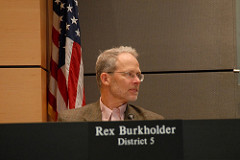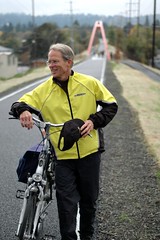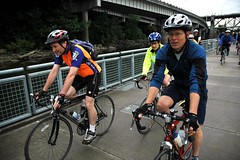Last Friday, I had the pleasure to host Rex Burkholder here at BikePortland.org Headquarters. We often cross paths at events and parties, and I work with him as a source on stories now and again, but it’s rare that we get the chance to talk uninterrupted for over an hour.
Earlier this month we did just that and I’ve decided to publish the conversation in several parts. In this first installment, I’ll share our conversation about his views on the Columbia River Crossing (CRC) project.
But first, here’s some quick background on Burkholder…
Burkholder is something of a Godfather figure in Portland’s bike story. The 5,000 member strong Bicycle Transportation Alliance (BTA) was founded in his kitchen and he has come up through the ranks — from leading the BTA to being elected to the Metro Council. Burkholder also serves as Chair of the region’s powerful Joint Policy Advisory Committee on Transportation and he is a sought-after speaker on transportation, land-use, and livability issues.
“You’ve got to figure out how to move things along and sometimes it’s a crooked way to get there.”
Now, let’s get on with the conversation.
Burkholder’s support for the Columbia River Crossing has surprised (shocked?) many in the community and it was like an elephant in the room. The first thing Burkholder wanted to get out of the way was that a comment left on this site back in July on one of our CRC stories was not written by him. The comment was signed “rex burkholder” and it was critical of my coverage of the project (saying I’ve been unfairly harsh).
With that out of the way, Burkholder and I talked about leadership. In speaking about making unpopular choices as a leader, he said*,
“You need to be able to make new allies all the time because the people who were your true believers are going to feel like you’ve abandoned them because you’re making decisions that aren’t pure.”
*(Burkholder was paraphrasing one of his instructors from college who said that, “Leadership is losing friends at the rate you can absorb.”)
As an elected leader, Burkholder said, he feels a responsibility to “fix things,” not just oppose them:
“When you have to fix things, when you’re responsible for it, you just have got to do it. You can keep going back and say, I oppose everything. But that’s not your job. Your job is to make things happen, you have to deliver projects to people. If you are in a group of seven people and you vote no all the time, you’re useless. If you’re always the one person out, you’re not changing anybody. You’ve got to figure out how to move things along and sometimes it’s a crooked way to get there.”
[Note: The rest of this story is in Q & A format, with my question/comment followed by his answer.]
Is that how you’d characterize your support of the CRC?
“Yes. Something had to be done. We have to do something. It’s too important to not fix.”
I think a lot of people see the CRC as a litmus test. They see it as a mega highway project and here we are in progressive Portland and there’s an opportunity for leaders, especially those like you who are progressive, to stand up to it. I think they see your support as a failure of that test.
“I had to go back and make sure all my connections were still good. I went back and talked to the leaders in the environmental community and people who oppose it. I told them that one thing we can disagree on but there’s this huge agenda that we can agree on. We have to agree to let that one (the CRC) go because I disagree with you and you disagree with me. Everyone has a right to their opinion, but there’s still a huge agenda we’re trying to move forward.”
“I consider the CRC a tree in the forest.”
So your idea is to move that larger agenda forward within the CRC as best you can?
“I consider the CRC a tree in the forest. The forest is how we live and the fact that we’re totally dependent on the car. So the question is, how do you change that? Fixing a broken bridge, in my mind, as well as in all the analysis, shows that it’s a tiny impact on the system on the whole. It’s not like you’re putting a new freeway out there; you’re just saying, ‘here’s a link that already exists and we’re fixing it and it’s expensive because cause we’re gonna have light rail and all these interchange improvements and we’ve gotta’ replace a bridge over a big river. Just by it’s own nature it’s expensive.
If you just look at it based on cost, you elevate its importance beyond what it is. We have a lot of other projects that are bigger that we have cancelled…like the I-5 99W connector. That’s only 1/8 the cost and yet it would have opened up everything to the SW (Newberg/McMinnville). Sprawl would have gone crazy.”
On what basis was that project cancelled?
“Because it’s not going to get us what we want. Washington County recognized that they’d never get support from the rest of the community. Another example is the Sunrise Corridor. That’s been on books for 30 years — gone. it would have created a situation like we have in East Portland with the I-205.”
I think many people wouldn’t agree that it’s just another tree in the forest. Because what’s being talked about isn’t just replacing what’s there but vastly increasing the size. Are you worried at all that by supporting the CRC that the end result might be something really huge that’s overbuilt?
“You have to have a certain amount of faith in the work that’s going on. If you’re going to believe that the modeling we have tells us ways to get away from the car and you can trust it, you’ve gotta have a faith that if it tells you something else it’s not lying to you.
Models aren’t perfect, but today (12/5) we heard at the oversight committee meeting from an independent outside group that said we’re (Metro) actually doing better than anyone else in terms of modeling…and that the induced demand is not an issue. It’s only like a 1% shift of population that might locate up near Ridgefield that wouldn’t locate there without the bridge.
In exchange for all the other benefits you’re getting — like putting light-rail across, putting bike and ped in there, solving the congestion problems — you’re going to get just a few more living further north. And those models were run before the housing market crashed 30-40% in northern Clark County and dropped only about 5% in inner-city areas. Some of that data is fighting against the mentality that someone would live on their ranchette in the country and drive their big SUV 30 miles to work every day.”
Let’s talk about design. Let’s imagine that we have all the money needed to build the CRC; do you think you and Metro Council will have adequate design oversight?
“It’s my job to do something and I’m sorry if you’re not happy, but guess what? I can’t let nothing happen, so that’s how it goes.”
“I think so. Well, I’m not at the table. I let David (Bragdon, Metro Council President) get to the table. It had to be Metro involvement, not Rex anymore, both for personal/political reasons and also because I put three years into it and it became about me instead of being about ‘Is this the right project or not, what should it look like and what’s Metro’s proper role?’
I think David is a very able representative of the concerns we have. Also, he’s able to back off and take a different look than I would because I was so deeply involved and felt I had to jump in and keep it from disappearing because of the lack of political acumen at ODOT — they just didn’t know how to do anything without poking somebody in the eye.
They’ve (CRC Task Force) empowered the oversight committee. It’s going to be a dance between the north side of the river and south side of the river. The DOTs (Oregon and Washington Departments of Transportation) just want to build a project…but they can’t succeed unless there’s an agreement on both sides.”
What about Mayor Adams? Have you or David Bragdon talked to him personally about this project?
“David has. Sam didn’t show up today (to the oversight committee meeting). That’s actually one of my fears is that he’ll delegate this important project (Editor’s note: Adams sent newly elected commissioner Amanda Fritz to the meeting as the City of Portland representative).”
The reason I ask is because I think a lot of people have the same feelings about Adams as they have about you. They hoped he would have stood up to this big thing, but he didn’t.
“Well, there are only two elected officials who voted against this project in the region; Robert Liberty and Carl Hosticka. Everyone else voted to go ahead. Everybody had conditions, and the conditions are all very similar. They’re saying justify everything more than six lanes and make sure light rail, tolls and bike access is in there.”
To me, it still seems like there’s a chasm between what a lot of people in the community think about the CRC, versus the overwhelming support it has gotten from their elected officials. What do you tell someone who comes up to you at an open house and says, ‘Rex, I’m disappointed, we shouldn’t build this’?
“I just say well, I’m sorry, we have to do something and this is the smartest thing to do. We spent three years going through all these same questions and doing nothing is not an option. It’s my job to do something and I’m sorry if you’re not happy, but guess what? I can’t let nothing happen, so that’s how it goes.”
Stay tuned for the next installment of my conversation with Rex Burkholder. Other topics we covered were; the role of electric cars and light rail in Oregon’s sustainable future, how to shift the statewide discussion toward bikes as a high-priority transportation solution, the role of Metro in promoting bikes, and more.
— See more of BikePortland’s coverage of the Columbia River Crossing project in the archives.




